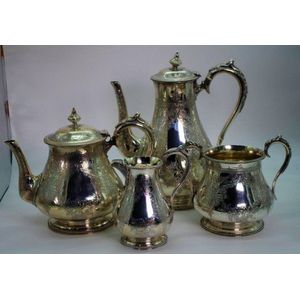19th Century Indian Silver Coffee Set with Deity Decorations
You must be a subscriber, and be logged in to view price and dealer details.
Subscribe Now to view actual auction price for this item
When you subscribe, you have the option of setting the currency in which to display prices to $Au, $US, $NZ or Stg.
- Arabesque - The arabesque pattern is an ornamental design that features flowing, curving lines and elaborate geometric shapes. It is inspired by the art and architecture of the Islamic world and was developed at Fontainebleu France in the mid 16th century. Its use was spread through published engravings, and it is characterized by its intricate and highly decorative nature. The arabesque pattern is created using a repetitive motif that is repeated and interwoven to create a cohesive design. It was used as a form of decoration in art, architecture, textiles, pottery, furniture and ceramics and it is often used to add a sense of grandeur and sophistication to a design. The arabesque pattern is admired for its beauty and complexity, and it continues to be used in a wide range of decorative contexts today.
- Embossed / Repousse - Embossing, also known as repousse, is the technique of decorating metal with raised designs, by pressing or beating out the design from the reverse side of the object.It is the opposite of chasing, where the decoration is applied from the front. An embossed or repoussed object may have chasing applied to finish off the design.
- Finial - An architectural decoration, found on the upper parts of of an object. On furniture they are usually found on pediments, canopies and shelf supports. On smaller ceramic or silver items, such as spoons, they may decorate the top of the item itself, or the lid or cover where they provide a useful handle for removal.
Finials have a variety of shapes and forms. They may be urn-shaped, baluster shaped round or spiral, but usually taper into an upper point. Many real life shapes may also be used as finials, such as pineapples, berries, pinecones, buds, lotus and acorns. Sometimes animals such as a lion are depicted, or fish and dolphins.
This item has been included into following indexes:
Visually similar items

Victorian sterling silver four piece tea/coffee set, hallmarked London 1875, maker Richards & Brown (Edward Charles Brown), retailed by S.Smith & Son 35 King street Covent Garden, comprising of a teapot, coffee pot, sugar and creamer, 2446 grams

American sterling coffee pot marked Whiting & Co 4161, 535g and 20 cm high

Victorian sterling silver four piece tea & coffee set lobed baluster shape with panels of stylised foliate scrolls, the tea & coffee pots with flowerhead finials, London, 1846

Five assorted New Zealand Railways plated tableware
